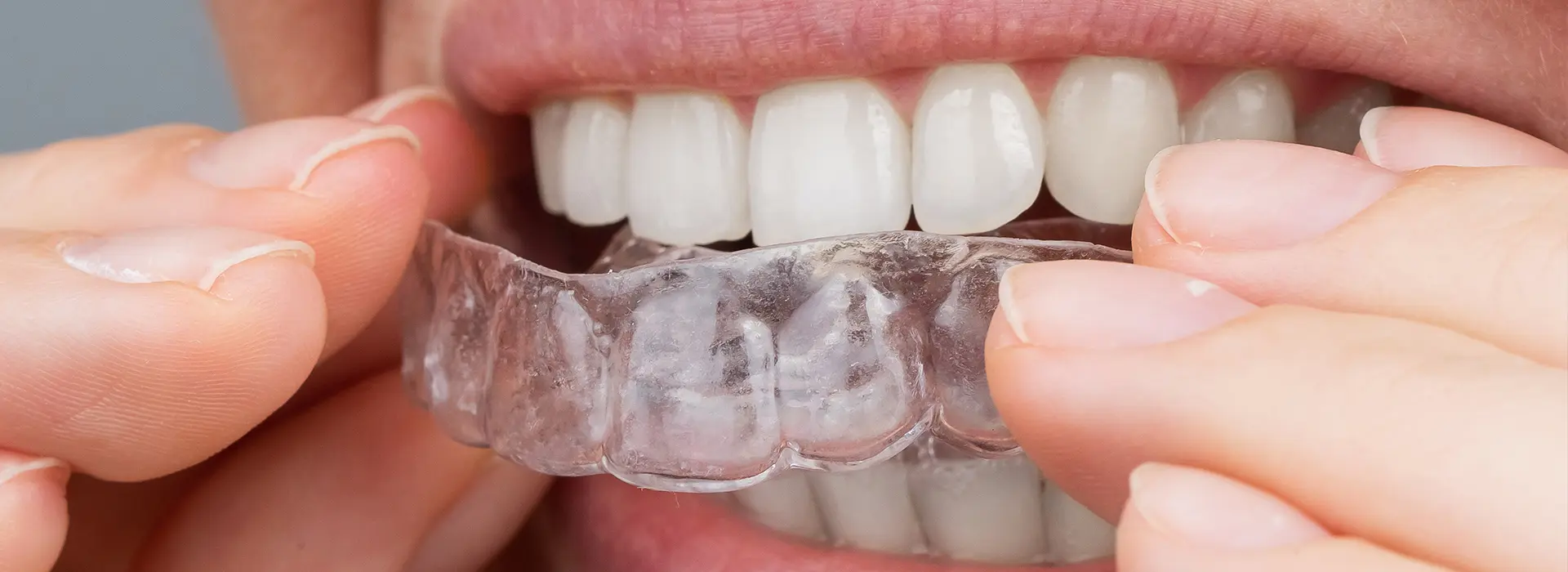Reviewed by Dr. Alan Baughman, DMD, MBA
Reading time: four minutes
Congratulations on taking the next step for your smile and health! Whether you’re wearing SureSmile® clear aligners, a mouthguard, or an oral appliance for sleep apnea, getting used to something new in your mouth can feel strange at first. You might notice soreness, extra saliva production, or a slight lisp, and that’s all part of the normal adjustment period.
The good news is, these awkward “side effects” are temporary. In this blog, you’ll learn simple tips to ease the transition and make your new dental appliance feel like a part of you.
Table of Contents
- Common Adjustments for Any New Appliance
- Specific Tips for Your Appliance Type
- When to Call Your Dentist
- FAQs
Key Takeaway
Getting used to a new dental appliance takes a little time, but mild soreness, extra saliva, or speech changes are temporary. With consistent use, your appliance will feel natural and become an easy part of your daily routine.
Common Adjustments for Any New Appliance
Most oral appliances come with an adjustment phase. While clear aligners are worn all the time, TMJ and sleep apnea devices are only worn at night. Here are a few things you might notice when you start wearing your new appliance:
- Initial discomfort or pressure: Your teeth, gums, or jaw muscles need time to adapt. Stick with soft foods like yogurt, eggs, and smoothies for the first couple of days.
- Speaking a little differently: A temporary lisp is very common. Practicing by reading aloud or talking more often can help your mouth adapt faster.
- Excess saliva production: Your mouth mistakes the appliance for food. Within a day or two, your saliva levels usually return to normal.
Specific Tips for Your Appliance Type
Because every dental appliance has a different role, your adjustment experience may vary.
Clear Aligners
When you first start wearing clear aligners, they will feel a bit bulky in your mouth. You might find that you have a slight lisp or that you are producing more saliva than normal.
You will also feel pressure on your teeth with every new tray that you put in. Pressure is good! It means your teeth are moving into place.
You might also experience something called ‘linea alba’, a white line on the inside of your cheeks. This is caused by friction from the aligners rubbing on the oral mucosa.
TMJ Oral Appliances (Splints or Night Guards)
It is normal to feel some jaw muscle soreness at first as your mouth adjusts to wearing the device. These appliances act as a protective barrier to prevent teeth grinding and reduce strain on the jaw.
With consistent use, most patients find they sleep more comfortably and wake up with less tension. Be sure to follow your dentist’s instructions on when to wear it.
Oral Appliances for Sleep Apnea
It can take about a week or so to get used to sleeping with your device. Mild morning tooth or jaw soreness is common in the beginning. These appliances gently reposition the jaw or tongue to keep the airway open, helping you breathe easier and sleep more soundly. Regular use makes the adjustment period go by more quickly.
| 💡 Caring for Your New Appliance Daily care makes your appliance last longer and keeps your oral health in top shape:Rinse and brush the appliance every morning or after removing it.Avoid hot water, which can warp plastic devices.Keep it in its case when not in use to prevent damage. |
When to Call Your Dentist
Some minor discomfort is expected, but certain issues should not be ignored. Contact Clearwater Dentistry right away if:
- You feel sharp pain instead of mild pressure
- A sharp edge is causing sores or irritation
- The appliance cracks or breaks
Have a question about your new appliance? We’re here to help you through the adjustment period. If you experience anything unusual, do not hesitate to call our team. We will make sure your appliance is comfortable and working as it should.
If you have questions or would like to book an appointment at our dental office in Greeley, CO, call (970) 515-3550 or visit us at 3110 67th Ave Pl, Greeley, CO.
FAQs
Mandibular advancement devices gently move the lower jaw forward during sleep to keep the airway open. They are not designed to change how you look. In some cases, long-term use can cause minor bite changes, but noticeable changes to facial appearance are very uncommon.
Most patients adjust within the first week or two, depending on the type of appliance. Clear aligners usually feel tight for a couple of days with each new tray. Night guards or TMJ appliances can cause temporary jaw muscle soreness that fades after regular use. Sleep apnea appliances often take about a week before sleeping with them feels natural.
If you live in Greeley or the surrounding area, Clearwater Dentistry welcomes new patients. Our team provides a wide range of services.


